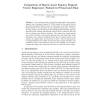Free Online Productivity Tools
i2Speak
i2Symbol
i2OCR
iTex2Img
iWeb2Print
iWeb2Shot
i2Type
iPdf2Split
iPdf2Merge
i2Bopomofo
i2Arabic
i2Style
i2Image
i2PDF
iLatex2Rtf
Sci2ools
108
click to vote
ESANN
2008
2008
Comparison of sparse least squares support vector regressors trained in primal and dual
In our previous work, we have developed sparse least squares support vector regressors (sparse LS SVRs) trained in the primal form in the reduced empirical feature space. In this paper we develop sparse LS SVRs trained in the dual form in the empirical feature space. Namely, first the support vectors that span the reduced empirical feature space are selected by the Cholesky factorization and LS SVR is trained in the dual form by solving a set of linear equations. We compare the computational cost of the LS SVRs in the primal and dual form and clarify that if the dimension of the reduced empirical feature space is almost equal to the number of training data, the dual form is faster. But the primal form is computationally more stable and for the large margin parameter the coefficient matrix of the dual form becomes near singular. By computer experiments using some benchmark data sets we verify the above results.
| Added | 29 Oct 2010 |
| Updated | 29 Oct 2010 |
| Type | Conference |
| Year | 2008 |
| Where | ESANN |
| Authors | Shigeo Abe |
Comments (0)

